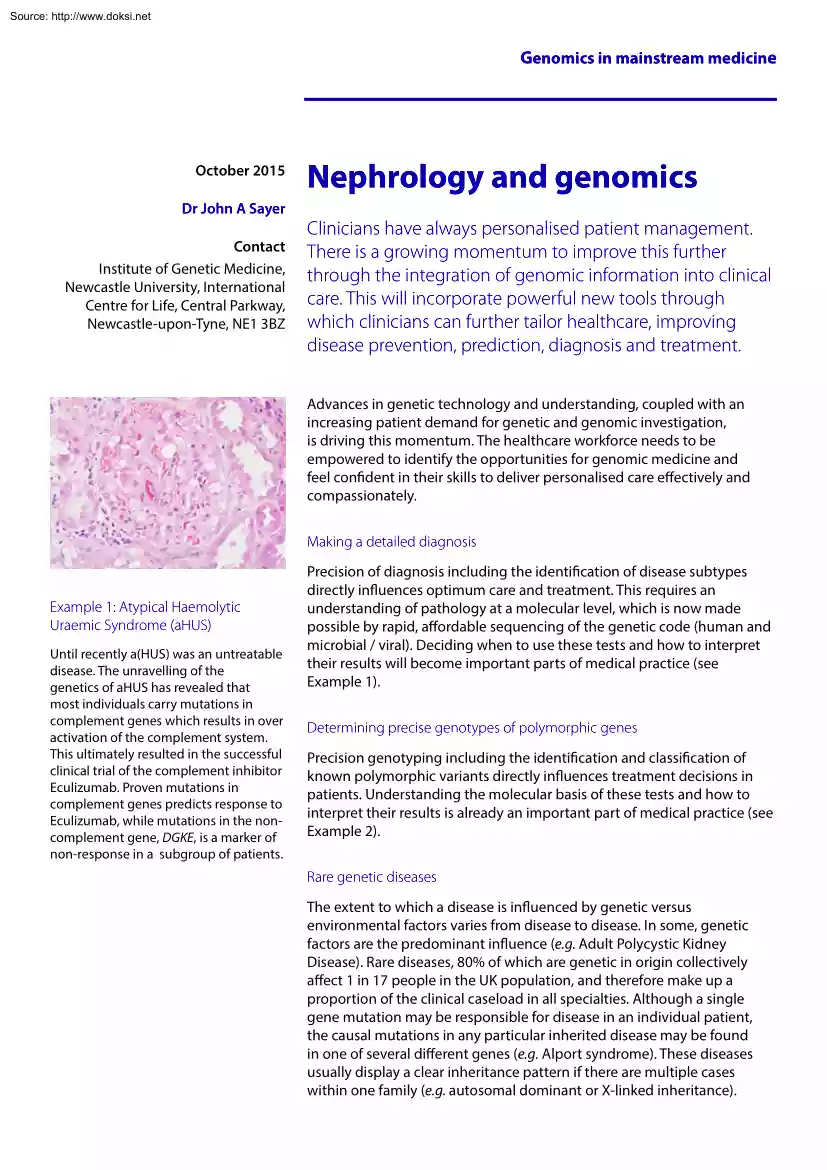A doksi online olvasásához kérlek jelentkezz be!

A doksi online olvasásához kérlek jelentkezz be!
Nincs még értékelés. Legyél Te az első!
Tartalmi kivonat
Source: http://www.doksinet Genomics in mainstream medicine October 2015 Nephrology and genomics Dr John A Sayer Contact Institute of Genetic Medicine, Newcastle University, International Centre for Life, Central Parkway, Newcastle-upon-Tyne, NE1 3BZ Clinicians have always personalised patient management. There is a growing momentum to improve this further through the integration of genomic information into clinical care. This will incorporate powerful new tools through which clinicians can further tailor healthcare, improving disease prevention, prediction, diagnosis and treatment. Advances in genetic technology and understanding, coupled with an increasing patient demand for genetic and genomic investigation, is driving this momentum. The healthcare workforce needs to be empowered to identify the opportunities for genomic medicine and feel confident in their skills to deliver personalised care effectively and compassionately. Making a detailed diagnosis Example 1: Atypical
Haemolytic Uraemic Syndrome (aHUS) Until recently a(HUS) was an untreatable disease. The unravelling of the genetics of aHUS has revealed that most individuals carry mutations in complement genes which results in over activation of the complement system. This ultimately resulted in the successful clinical trial of the complement inhibitor Eculizumab. Proven mutations in complement genes predicts response to Eculizumab, while mutations in the noncomplement gene, DGKE, is a marker of non-response in a subgroup of patients. Precision of diagnosis including the identification of disease subtypes directly influences optimum care and treatment. This requires an understanding of pathology at a molecular level, which is now made possible by rapid, affordable sequencing of the genetic code (human and microbial / viral). Deciding when to use these tests and how to interpret their results will become important parts of medical practice (see Example 1). Determining precise genotypes of
polymorphic genes Precision genotyping including the identification and classification of known polymorphic variants directly influences treatment decisions in patients. Understanding the molecular basis of these tests and how to interpret their results is already an important part of medical practice (see Example 2). Rare genetic diseases The extent to which a disease is influenced by genetic versus environmental factors varies from disease to disease. In some, genetic factors are the predominant influence (e.g Adult Polycystic Kidney Disease). Rare diseases, 80% of which are genetic in origin collectively affect 1 in 17 people in the UK population, and therefore make up a proportion of the clinical caseload in all specialties. Although a single gene mutation may be responsible for disease in an individual patient, the causal mutations in any particular inherited disease may be found in one of several different genes (e.g Alport syndrome) These diseases usually display a clear
inheritance pattern if there are multiple cases within one family (e.g autosomal dominant or X-linked inheritance) Source: http://www.doksinet Genomics in mainstream medicine Example 2: HLA tissue typing The Major Histocompatibility Complex (MHC) is a gene dense region located on the short arm of Chromosome 6 at 6p21.3 containing genes involved in immunity. The MHC includes two highly polymorphic gene families the Human Leukocyte Antigens (HLA). HLA class I and II typing of donor and recipient has been shown to be important in all forms of transplantation, and is used to select donors prior to renal transplantation. Cellular based assays examining protein expression have now been replaced by genomic DNA testing which allows definition of a genotype to determine the HLA type at the DNA level. The introduction of Next Generation Sequencing strategies now allows HLA typing of donors and recipients to be faster and more economical. Advances in genetic knowledge and sequencing have led
to the development of new genetic tests for rare monogenic diseases. With older technologies, these tests were expensive and time-consuming, and were usually offered as single-gene tests as determined by genetics specialists. Increasingly, new technologies allow for these single genes related to the suspected condition to be gathered together into multiple ‘panels’ of genes and tested in parallel, at vastly reduced time and expense. It is likely that clinicians across multiple specialties will have access to these tests, and eventually to tests for all genes or even the whole genome. The UK GTN website provides information on genetic tests that are currently listed on the NHS directory of genetic tests. NHS test development is now focusing on panel tests, enabling diagnosis at an earlier stage of investigation. Use of genetic testing will be supported by clinical guidelines, published testing criteria and educational resources (useful contact details for support are provided at the
end of this document). However, it is recognised that expert support will still be required to help with interpreting the results from larger panels, as there is a greater risk of finding changes in the genome that are of uncertain significance. Complex ethical issues involving family members may also need to be addressed. Genetics of common complex diseases Most common diseases (e.g chronic kidney disease) are complex in aetiology, caused by a combination of environmental risk factors and an underlying genetic susceptibility. Recent advances in medical genetics have led to a more comprehensive understanding of the contribution to different diseases of genetic factors. As well as contributing to a greater understanding of pathways involved in disease mechanisms (which are potential targets for drug development) , investigation of rare cases of ‘genetic’ disease has been important for understanding the more common forms of a disease (see Example 3). Pharmacogenomics and treatment
Even after taking into account disease sub-phenotypes, there is considerable variability in individual responses to medicines which can be due to differences in the way a drug is handled in the body (pharmacokinetics) and / or variation in the drug targets (for example, receptors, enzymes, ion channels etc.) Knowledge of the genomic influences in these processes, when combined with clinical risk factors can provide insights into how a patient will respond in terms of efficacy to a given drug which may alter drug choice and / or dose. This information can also predict susceptibility to adverse drug reactions, including those at the more severe end of the spectrum (see Example 4). With the development of rapid sequencing assays, and multiple Source: http://www.doksinet Genomics in mainstream medicine Example 3 : The Role of UMOD in Hypertension and Chronic Kidney Disease. Mutations in UMOD, which encodes uromodulin, are associated with Medullary Cystic Kidney Disease Type 2, a rare
dominantly inherited cause of chronic kidney disease. Recent Genome Wide Association Study studies have identified susceptibility variants for chronic kidney disease and hypertension in UMOD. Risk variants in UMOD directly increase UMOD expression, leading to saltsensitive hypertension, secondary to activation of the renal sodiumpotassium-chloride cotransporter NKCC2. Uromodulin may be a novel therapeutic target to control blood pressure and preserve renal function. gene panels, it is anticipated that testing for relevant genetic variants that influence both drug efficacy and drug safety will be increasingly used to aid both drug and dosage selection. Such information is being incorporated into the summary of product characteristics of individual drugs, and is reflected in the guidance provided by regulatory agencies such as the European Medicines Agency and the FDA. Personalised medicine using genomics Personalised medicine recognises that people differ in their risk of disease and
in their likely response to therapeutic interventions. Genetic differences account for some of this variation. Testing may be used to identify individuals with rare mutations associated with a high risk of disease, for which specific treatment measures may be offered (e.g alpha-galactosidase enzyme replacement therapy for Fabry’s disease). Currently, such individuals are usually identified through clinical diagnosis or cascade testing within families. However, the wider availability of genome-wide testing may soon mean that patients learn about these risks unexpectedly when tested for other clinical reasons. It is also anticipated that testing for a range of genetic susceptibility variants for common diseases (e.g hypertension) will become routinely feasible and such data could be incorporated into risk assessment tools, allowing individuals to be more accurately placed into different risk groups within the population. Ethical, legal, social and organisational implications Example 4
: Thiopurine Methyltransferase (TPMT) testing Azathioprine (AZA) is an important immunomodulatory drug, used in the treatment of lupus nephritis and to prevent renal transplant rejection. AZA is converted to its active metabolites by several enzymes, the most critical of which is TPMT. Low levels of TPMT activity results in the overproduction of AZA metabolites that are toxic to bone marrow, leading to bone marrow suppression and potentially lifethreatening side effects. TPMT activity is influenced by polymorphisms in the TPMT gene some of which lead to higher risk of adverse side effects from AZA treatment. Genotyping of the TPMT gene using sequencing (as well as assays directly measuring TPMT activity) can predict patients at higher risk of AZA toxicity, and help in personalising the dose and choice of immunosuppressant. There are a number of broader challenges that will influence the use of genomic medicine. These include: • Developing skills and expertise in genomics within the
wider health professional workforce • Issues relating to patient communication, privacy and consent (particularly for genomic testing in children) • Handling uncertain, unexpected or incidental findings from genomic tests in clinical practice • Implications of clinically significant results for other family members • Bioinformatics provision and secure genomic data storage and access within the health service • Impact of genomics on current healthcare services, resources and patient pathways (including equity of access to genomic tests) • Developing intelligent decision support systems that allow the use of genomic and clinical information to aid in the prescribing of drugs at the right dose • Clarifying risks and benefits associated with using genomic tests for opportunistic screening Source: http://www.doksinet Genomics in mainstream medicine Further information and resources The Renal Association, Durford Mill, Petersfield, Hampshire, GU31 5AZ
www.renalorg HEE Genomics Education Programme Health Education England Information on genomics education including HEE sponsored MSc., Diploma, PG Certificate and CPPD genomics courses 0121 695 2374 genomicseducation@wm.heenhsuk www.genomicseducationheenhsuk Online module, St George’s, University of London, The Genomics Era: the future of genetics in medicine www.futurelearncom/courses/thegenomics-era UK Genetic Testing Network (UK GTN) 0203 350 4999 ukgtn@nwlcsu ukgtn.nhsuk UK Pharmacogenetics and Stratified Medicine network www.uk-pgx-stratmedcouk Genomics England www.genomicsenglandcouk Personal Genomes UK www.personalgenomesorg/uk Mallett A, et al. Genomics in the renal clinic - translating nephrogenetics for clinical practice. Hum Gen 2015 Jun 24;9:13. doi: 101186/s40246-015-0035-1 The future The last two decades have seen unprecedented investment in life sciences in the UK. Advanced technologies are now available to sequence the entire genome at a cost of a few thousand pounds
in as little as 24 hours, and it is envisaged that this cost will fall considerably over the next few years. More recently, the Government has signalled its confidence in the power of genomic science to produce major health benefits for the population through its investment in the 100,000 Genomes Project. This project’s emphasis on rare diseases will allow many inherited renal disorders to be explored. However, achieving these benefits will depend on the ability of clinicians to use these new technologies effectively, efficiently and responsibly, for the population as a whole. Genomics can no longer be left to specialists and enthusiasts, but must be grasped by every clinician throughout the NHS. Through the ‘Clinical Champions’ network, the Royal College of Physicians aims to promote education and training in genomics within every specialty. This will ensure that clinicians of the future are ready to capitalise on all of these new developments to provide personalised care for
their patients
Haemolytic Uraemic Syndrome (aHUS) Until recently a(HUS) was an untreatable disease. The unravelling of the genetics of aHUS has revealed that most individuals carry mutations in complement genes which results in over activation of the complement system. This ultimately resulted in the successful clinical trial of the complement inhibitor Eculizumab. Proven mutations in complement genes predicts response to Eculizumab, while mutations in the noncomplement gene, DGKE, is a marker of non-response in a subgroup of patients. Precision of diagnosis including the identification of disease subtypes directly influences optimum care and treatment. This requires an understanding of pathology at a molecular level, which is now made possible by rapid, affordable sequencing of the genetic code (human and microbial / viral). Deciding when to use these tests and how to interpret their results will become important parts of medical practice (see Example 1). Determining precise genotypes of
polymorphic genes Precision genotyping including the identification and classification of known polymorphic variants directly influences treatment decisions in patients. Understanding the molecular basis of these tests and how to interpret their results is already an important part of medical practice (see Example 2). Rare genetic diseases The extent to which a disease is influenced by genetic versus environmental factors varies from disease to disease. In some, genetic factors are the predominant influence (e.g Adult Polycystic Kidney Disease). Rare diseases, 80% of which are genetic in origin collectively affect 1 in 17 people in the UK population, and therefore make up a proportion of the clinical caseload in all specialties. Although a single gene mutation may be responsible for disease in an individual patient, the causal mutations in any particular inherited disease may be found in one of several different genes (e.g Alport syndrome) These diseases usually display a clear
inheritance pattern if there are multiple cases within one family (e.g autosomal dominant or X-linked inheritance) Source: http://www.doksinet Genomics in mainstream medicine Example 2: HLA tissue typing The Major Histocompatibility Complex (MHC) is a gene dense region located on the short arm of Chromosome 6 at 6p21.3 containing genes involved in immunity. The MHC includes two highly polymorphic gene families the Human Leukocyte Antigens (HLA). HLA class I and II typing of donor and recipient has been shown to be important in all forms of transplantation, and is used to select donors prior to renal transplantation. Cellular based assays examining protein expression have now been replaced by genomic DNA testing which allows definition of a genotype to determine the HLA type at the DNA level. The introduction of Next Generation Sequencing strategies now allows HLA typing of donors and recipients to be faster and more economical. Advances in genetic knowledge and sequencing have led
to the development of new genetic tests for rare monogenic diseases. With older technologies, these tests were expensive and time-consuming, and were usually offered as single-gene tests as determined by genetics specialists. Increasingly, new technologies allow for these single genes related to the suspected condition to be gathered together into multiple ‘panels’ of genes and tested in parallel, at vastly reduced time and expense. It is likely that clinicians across multiple specialties will have access to these tests, and eventually to tests for all genes or even the whole genome. The UK GTN website provides information on genetic tests that are currently listed on the NHS directory of genetic tests. NHS test development is now focusing on panel tests, enabling diagnosis at an earlier stage of investigation. Use of genetic testing will be supported by clinical guidelines, published testing criteria and educational resources (useful contact details for support are provided at the
end of this document). However, it is recognised that expert support will still be required to help with interpreting the results from larger panels, as there is a greater risk of finding changes in the genome that are of uncertain significance. Complex ethical issues involving family members may also need to be addressed. Genetics of common complex diseases Most common diseases (e.g chronic kidney disease) are complex in aetiology, caused by a combination of environmental risk factors and an underlying genetic susceptibility. Recent advances in medical genetics have led to a more comprehensive understanding of the contribution to different diseases of genetic factors. As well as contributing to a greater understanding of pathways involved in disease mechanisms (which are potential targets for drug development) , investigation of rare cases of ‘genetic’ disease has been important for understanding the more common forms of a disease (see Example 3). Pharmacogenomics and treatment
Even after taking into account disease sub-phenotypes, there is considerable variability in individual responses to medicines which can be due to differences in the way a drug is handled in the body (pharmacokinetics) and / or variation in the drug targets (for example, receptors, enzymes, ion channels etc.) Knowledge of the genomic influences in these processes, when combined with clinical risk factors can provide insights into how a patient will respond in terms of efficacy to a given drug which may alter drug choice and / or dose. This information can also predict susceptibility to adverse drug reactions, including those at the more severe end of the spectrum (see Example 4). With the development of rapid sequencing assays, and multiple Source: http://www.doksinet Genomics in mainstream medicine Example 3 : The Role of UMOD in Hypertension and Chronic Kidney Disease. Mutations in UMOD, which encodes uromodulin, are associated with Medullary Cystic Kidney Disease Type 2, a rare
dominantly inherited cause of chronic kidney disease. Recent Genome Wide Association Study studies have identified susceptibility variants for chronic kidney disease and hypertension in UMOD. Risk variants in UMOD directly increase UMOD expression, leading to saltsensitive hypertension, secondary to activation of the renal sodiumpotassium-chloride cotransporter NKCC2. Uromodulin may be a novel therapeutic target to control blood pressure and preserve renal function. gene panels, it is anticipated that testing for relevant genetic variants that influence both drug efficacy and drug safety will be increasingly used to aid both drug and dosage selection. Such information is being incorporated into the summary of product characteristics of individual drugs, and is reflected in the guidance provided by regulatory agencies such as the European Medicines Agency and the FDA. Personalised medicine using genomics Personalised medicine recognises that people differ in their risk of disease and
in their likely response to therapeutic interventions. Genetic differences account for some of this variation. Testing may be used to identify individuals with rare mutations associated with a high risk of disease, for which specific treatment measures may be offered (e.g alpha-galactosidase enzyme replacement therapy for Fabry’s disease). Currently, such individuals are usually identified through clinical diagnosis or cascade testing within families. However, the wider availability of genome-wide testing may soon mean that patients learn about these risks unexpectedly when tested for other clinical reasons. It is also anticipated that testing for a range of genetic susceptibility variants for common diseases (e.g hypertension) will become routinely feasible and such data could be incorporated into risk assessment tools, allowing individuals to be more accurately placed into different risk groups within the population. Ethical, legal, social and organisational implications Example 4
: Thiopurine Methyltransferase (TPMT) testing Azathioprine (AZA) is an important immunomodulatory drug, used in the treatment of lupus nephritis and to prevent renal transplant rejection. AZA is converted to its active metabolites by several enzymes, the most critical of which is TPMT. Low levels of TPMT activity results in the overproduction of AZA metabolites that are toxic to bone marrow, leading to bone marrow suppression and potentially lifethreatening side effects. TPMT activity is influenced by polymorphisms in the TPMT gene some of which lead to higher risk of adverse side effects from AZA treatment. Genotyping of the TPMT gene using sequencing (as well as assays directly measuring TPMT activity) can predict patients at higher risk of AZA toxicity, and help in personalising the dose and choice of immunosuppressant. There are a number of broader challenges that will influence the use of genomic medicine. These include: • Developing skills and expertise in genomics within the
wider health professional workforce • Issues relating to patient communication, privacy and consent (particularly for genomic testing in children) • Handling uncertain, unexpected or incidental findings from genomic tests in clinical practice • Implications of clinically significant results for other family members • Bioinformatics provision and secure genomic data storage and access within the health service • Impact of genomics on current healthcare services, resources and patient pathways (including equity of access to genomic tests) • Developing intelligent decision support systems that allow the use of genomic and clinical information to aid in the prescribing of drugs at the right dose • Clarifying risks and benefits associated with using genomic tests for opportunistic screening Source: http://www.doksinet Genomics in mainstream medicine Further information and resources The Renal Association, Durford Mill, Petersfield, Hampshire, GU31 5AZ
www.renalorg HEE Genomics Education Programme Health Education England Information on genomics education including HEE sponsored MSc., Diploma, PG Certificate and CPPD genomics courses 0121 695 2374 genomicseducation@wm.heenhsuk www.genomicseducationheenhsuk Online module, St George’s, University of London, The Genomics Era: the future of genetics in medicine www.futurelearncom/courses/thegenomics-era UK Genetic Testing Network (UK GTN) 0203 350 4999 ukgtn@nwlcsu ukgtn.nhsuk UK Pharmacogenetics and Stratified Medicine network www.uk-pgx-stratmedcouk Genomics England www.genomicsenglandcouk Personal Genomes UK www.personalgenomesorg/uk Mallett A, et al. Genomics in the renal clinic - translating nephrogenetics for clinical practice. Hum Gen 2015 Jun 24;9:13. doi: 101186/s40246-015-0035-1 The future The last two decades have seen unprecedented investment in life sciences in the UK. Advanced technologies are now available to sequence the entire genome at a cost of a few thousand pounds
in as little as 24 hours, and it is envisaged that this cost will fall considerably over the next few years. More recently, the Government has signalled its confidence in the power of genomic science to produce major health benefits for the population through its investment in the 100,000 Genomes Project. This project’s emphasis on rare diseases will allow many inherited renal disorders to be explored. However, achieving these benefits will depend on the ability of clinicians to use these new technologies effectively, efficiently and responsibly, for the population as a whole. Genomics can no longer be left to specialists and enthusiasts, but must be grasped by every clinician throughout the NHS. Through the ‘Clinical Champions’ network, the Royal College of Physicians aims to promote education and training in genomics within every specialty. This will ensure that clinicians of the future are ready to capitalise on all of these new developments to provide personalised care for
their patients




 Írásunkban a műelemzések készítésének módszertanát járjuk körül. Foglalkozunk az elemzés főbb fajtáival, szempontjaival és tanácsokat adunk az elemzés legfontosabb tartalmi elemeivel kapcsolatban is. Módszertani útmutatónk főként tanulók számára készült!
Írásunkban a műelemzések készítésének módszertanát járjuk körül. Foglalkozunk az elemzés főbb fajtáival, szempontjaival és tanácsokat adunk az elemzés legfontosabb tartalmi elemeivel kapcsolatban is. Módszertani útmutatónk főként tanulók számára készült!